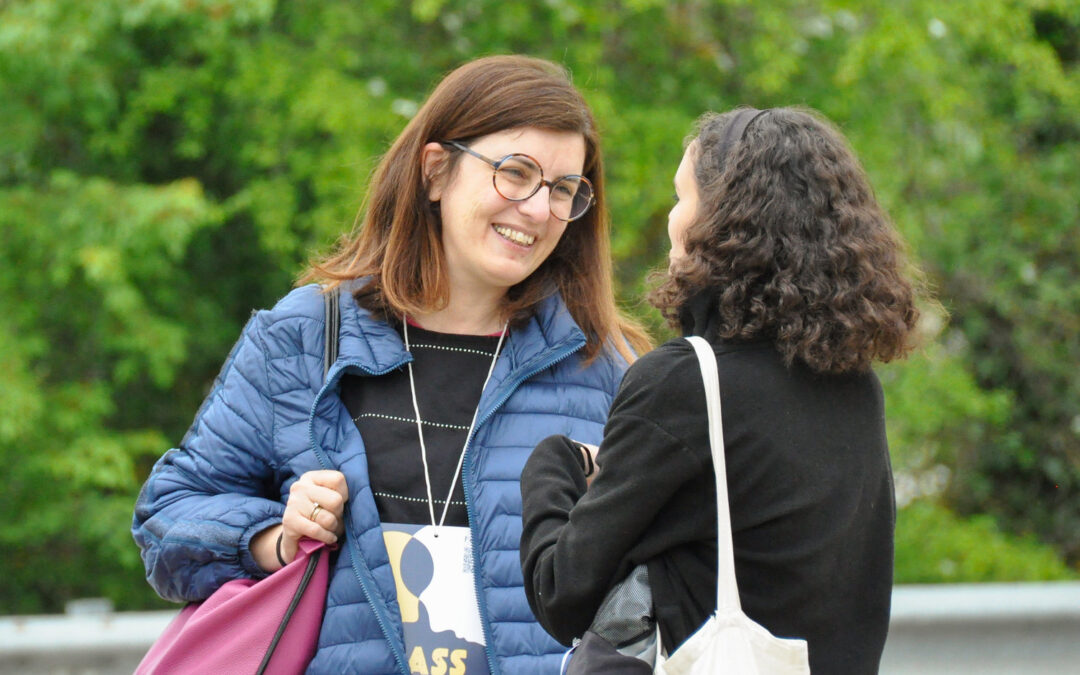
1 Mar 2025 | Idea of the Month, Testimonianze di Vita
It seems obvious that we are made to relate to other people: in fact, we could even say that our lives are intertwined by the relationships we make. However, we sometimes we risk spoiling the latter with our harsh or superficial judgements.
Throughout history, various images have become part of everyday language. Thus, in
ancient tradition we find a well-known expression that says: ‘Why do you look at the speck in your brother’s eye and not notice the plank in your own?’[1] Equally proverbial is the image of the two saddlebags: one in front of our eyes, filled with the faults of other people which we easily see, and the other on our backs, holding our own faults which we then struggle to recognise.[2] There is also a Chinese proverb that says, ‘Man is blind to his own faults but has eagle eyes for those of others.’
This does not mean that we should indiscriminately accept what other people do and just let events run their course. Faced with injustice, violence or oppression, we cannot close our eyes. We must commit ourselves to change and start by looking at ourselves and listening sincerely to our own consciences to discover what we need to improve. Only then can we ask ourselves how we can concretely help others by sometimes offering advice and correction.
Each one of us needs ‘another point of view’ that offers a perspective different from our
own, enriching our ‘truth’ and helping us to avoid self-referentiality and those errors of judgement that are part of our human nature.
The word “mercy” may seem old fashioned but it is rich with meaning relevant to today: we can be merciful first towards ourselves and then towards others too. In fact, only if we are able to accept and forgive our own limitations will we be able to welcome the weaknesses and mistakes of others. Indeed, when we realise that unconsciously we may be feeling superior and in a position to judge other people, it is vital that we are willing to take ‘the first step’ towards the other person to avoid damaging the relationship.
Chiara Lubich told a group of Muslims about her experience when she and her companions lived in a small house in Trent as they began their adventures at the start of the Movement. Not everything was simple and there were misunderstandings. “It was not always easy to love in aradical way […] “Dust” could settle on our relationships and unity could diminish. This happened, for example, when we became aware of the faults and imperfections of others and judged them, so our mutual love grew cold. One day, we decided we should try to counter this situation and we decided
to make a pact among ourselves and called it a ‘pact of mercy’. We decided that every morning we would see the people we met – at home, at school, at work, etc. – as new without calling to mind their faults but covering everything with love.” [3] his is a ‘method’ worth putting into practice in groups at work, in the family and in
communities of all kinds.
© Foto di Cottonbro studio – Pexels
THE IDEA OF THE MONTH is currently produced by the Focolare Movement’s “Centre for Dialogue with People of Non-religious Beliefs”. It is an initiative that began in 2014 in Uruguay to share with non-believing friends the values of the Word of Life, i.e. the phrase from Scripture that members of the Movement strive to put into practice in their daily lives. Currently, THE IDEA OF THE MONTH is translated into 12 languages and distributed in more than 25 countries, with adaptations of the text according to different cultural sensitivities. dialogue4unity.focolare.org
[1] (Lc 6,41)
[2] Esopo (μῦθοι) , Fedro (Fabulae)
[3] C. Lubich, L’amore al prossimo, Conversazione con gli amici musulmani, Castel Gandolfo, 1° novembre 2002. Cf. C. Lubich, L’Amore reciproco, Città Nuova, Roma 2013, pp. 89-90.

1 Feb 2025 | Idea of the Month
Sometimes we are faced with situations where it is difficult to make a judgment or take a clear position. Wetry to understand the deeper meaning of whatever we are facing and comprehendits significance andvaried perspectives.
We need a light to guide us. Just as underground miners move forward one meter at a time with the help of a simple lantern, we too have a light that can illuminate our steps, one by one. We know what this is: love for each other is a powerful light that guides us and helps with the difficult task of informing our personal consciences as we journey through life.
We need to be able to be aware of the complexity of views and opinions held by people around us or those we meet sometimes by chance. It is important to always maintain a sense of honesty and to be aware of the limitation of our own point of view. Openness of mind and heart, the fruit of true love, creates a capacity for a dialogue that listens, that looks for the good in the other person and is open to the possibility of creating something together.
Timothy Radcliffe, one of the theologians present at the last Synod of Bishops of the Catholic Church, referred to this personal need we may experience. He told members of the Synod that: ” The bravest thing we can do is to be honest with each other about our doubts and questions, those for which we have no clear answers. Then we will approach each other as fellow seekers, beggars of truth (1)”.
In a conversation with members of the Focolare, Margaret Karram commented on this reflection: ‘Thinking about it, I realised that many times I did not have the courage to really say what I thought: perhaps because I was afraid of not being understood or because I didn’t want to be different from the majority. I realised that being “beggars of truth” means having that attitude of closeness towards one another, in which we seek the good of the other.”(2).
This is Antía’s, experience. She is a member of “Mosaico”, a performing arts group that began in Spain in 2017. It is composed of young Spaniards from different backgrounds and cultures who use their art and workshops to offer their experience of fraternity to others. Antia tells us: ‘It connects with my values – a fraternal world, in which everyone (very young, inexperienced, vulnerable…) gives their contribution to the project. “Mosaico” makes me believe that a more united world is not a utopia, despite the difficulties and hard work involved. I grew up working in a team where dialogue was too honest at times and I often gave up on my own ideas which I believed to be the best. I see that in this project “good” is built piece by piece together, by us all ” (3).
1. Timothy Radcliffe, Meditation to Synod of Bishops, 2.10.2023
2. Margaret Karram, President of Focolare Movement, 3.02.2024
3. Mosaic GRLP
Foto: © Comunicazione Loppiano
THE IDEA OF THE MONTH is currently produced by the Focolare Movement’s “Centre for Dialogue with People of Non religious Beliefs“. It is an initiative that began in 2014 in Uruguay to share with non-believing friends the values of the Word of Life, i.e. the phrase from Scripture that members of the Movement strive to put into practice in their daily lives. Currently, THE IDEA OF THE MONTH is translated into 12 languages and distributed in more than 25 countries, with adaptations of the text according to different cultural sensitivities.

1 Jan 2025 | Idea of the Month
When people of different cultures and religious beliefs are in dialogue, a question that often
comes to the fore is: “Can we always hope? And in what?”
It’s a question that resonates most intensely not only in times of difficulty and painful suffering or defeat but also when we feel disappointed and deluded by the ideals and values we have held dear and which have fascinated us in the past.
It is precisely during these times of doubt that we are prompted to reconsider the values and beliefs that lie at the very basis of our hopes. These values give us the strength to face our doubts and reveal the greatness of human nature: men and women are capable of falling down and rising up again, they can acknowledge that they all have their weaknesses but without succumbing to uselessly dreaming of finding miraculous solutions.
Believing is much more than hoping for a solution to our problems; rather, it is the drive within
that allows us to keep going. It is in those difficult moments that life mysteriously can become a
real gift.
Believing is like a commitment that gives meaning to life always. Unlike accepting a contract that you sign once and then never look at again, believing transforms and permeates every daily choice.
One method that may help us to do so is to avoid thinking about dramatic and extreme situations which can only make us afraid and block us, but to face the small difficulties of each day, sharing them with our friends. In this way, if we do not lose heart, we will discover many new opportunities to believe and to give hope to those around us. The strength of friendship seeks the good of the other.
It is easier to feel strong and courageous when everything is going well but it is when we are aware
of our vulnerabilities that we can build something that will remain after us. We become aware of
this through the conviction we gain when we have shared life with someone who believed beyond
everything, who struggled and suffered, and whose love brought them close to everyone. When
these people conclude their lives on this earth, they leave such an imprint and their memory is so
vivid that -mysteriously- whether we are religious or non religious, their example makes us say, “I
believe, I believe. Let us continue together!”
Photo ©Sasin Tipchai – Pixabay
THE IDEA OF THE MONTH is currently produced by the Focolare Movement’s “Centre for Dialogue with People of Non religious Beliefs”. It is an initiative that began in 2014 in Uruguay to share with non-believing friends the values of the Word of Life, i.e. the phrase from Scripture that members of the Movement strive to put into practice in their daily lives. Currently, THE IDEA OF THE MONTH is translated into 12 languages and distributed in more than 25 countries, with adaptations of the text according to different cultural sensitivities. dialogue4unity.focolare.org

1 Dec 2024 | Idea of the Month
We may feel frightened when life presents us with challenging and unexpected choices but, nonetheless, it is then that our values and the desire to live with integrity clearly emerge.
It’s not always easy. When the answer to a situation requires our free and personal choice, we may feel that we are taking a difficult gamble, almost a leap in the dark, and we need the strength to go beyond our own limits.
Where can we find the strength to do this? For some people it comes from faith in the supernatural and belief in a personal God who loves us and accompanies us. For everyone it can come from the closeness of friends, of “travel companions” who support us, trust us and who we feel are near as we journey through life. They bring out the best in us and help us overcome the apparent “impossibility” of our insufficiencies to achieve the “possible” of a coherent way of life.
This happens as a consequence of relationships that are reciprocal and impacts upon us as members of a community. As Chiara Lubich said in 1948, using language typical of the time: “Let’s go ahead! Not with our strength, petty and weak as it may be, but with the omnipotence of unity. If we remain faithful to our commitment […] the world will see unity.”[1]
Going beyond our limits opens us to new opportunities and experiences that might otherwise seem out of our reach, allowing us to believe and witness that nothing we hope for is impossible.
But is it possible to believe “that everything is possible” in the face of the absurdity of Evil? This is the great question that humanity continues toask today as it has always done in the past.The absence of response unites everyone, believers and non-believers, as they search for the answeron a journey that can only be undertaken together. Because if “Evil” remains a mystery, the force of “Good” is equally powerful. There is no answer, but a way of understanding.
Edith Bruck recalled this in a recent interview.ii She was deported to Auschwitz at the age of 13 but still today, in her nineties, is a real witness of peace. When the war ended, she and her sister were faced with a dramatic dilemma. “Five Hungarian fascists who had supported the Nazis begged us to help them return home secretly and we did so by helping them on their journey. We shared bread and chocolate with them. It was one of the most intense moments I had ever experienced spiritually. I was treating someone who could have killed my father as a friend.” The decision was not easy and she argued a lot with her sister, but they did it because they thought that perhaps, this way, these people would never mistreat a Jew again. [2]
THE IDEA OF THE MONTH is currently produced by the Focolare Movement’s “Centre for Dialogue with People of Non religious Beliefs”. It is an initiative that began in 2014 in Uruguay to share with non-believing friends the values of the Word of Life, i.e. the phrase from Scripture that members of the Movement strive to put into practice in their daily lives. Currently, THE IDEA OF THE MONTH is translated into 12 languages and distributed in more than 25 countries, with adaptations of the text according to different cultural sensitivities. dialogue4unity.focolare.org
Photo: © Pixabay
[1] Chiara Lubich, “Letters of the Early Times”.
[2] Marisol Rojas Cadena SER- article on E. Bruck 26/01/2024

1 Nov 2024 | Idea of the Month
Every day we are bombarded by images that emphasise the value that our society places upon appearance. Globalization imposes a model in every part of the world whereby wealth, power and physical beauty seem to be the only values. Yet it is enough to stop and observe the people we meet daily in our cities (on trains, in the underground, on the street) to realize that there is a different reality, made up of small daily gestures of solidarity: for example, there are parents who accompany their children to school, nurses who get up at dawn to go to work alongside people who are suffering and there are workers who carry out their tasks with great commitment in factories, stores andoffices. In addition, there are countless voluntary activities.
There is a need to look truthfully at the world and go beyond appearances. We should value the positive in each person and realize that it is these small daily gestures of support and solidaritythat keep society on its feet. Even more revolutionary are the actions of those who, despite living in situations bordering on poverty, realize that they can still “give” in some way. Theywelcome others, share a meal or a room because there is always someone who has “more need” than themselves.Furthermore, they do this out of a sense of justice and with a generous and selfless heart.
We know that giving does not refer only to material things. Chiara Lubich used to tell us,: let this be the word that gives us no respite. “Let us always give; let us give a smile, understanding, forgiveness, a listening ear; let us give to others by drawing on our intelligence, our will, our availability; let us give our time, our talents, our ideas (…), our actions; let us share our experiences, our abilities and our possessions. By constantly reviewing what we no longer need and and sharing with others, we ensure everything circulates. ‘Give’ is the word that could accompany us always.”1
This idea, then, is an invitation to have a generosity that comes from within, from the purity of hearts that knows how to recognize the suffering of humanity and see themselves reflected in the disfigured faces of their neighbours. This is the very gift that makes us free and more capable of loving.
This what Etty Hillesum experienced. She was, a young Dutch woman who lived the last years of her life in a concentration camp before dying in Auschwitz. She was able to love the beauty of life till the very end and gave thanks for “this gift of being able to understand and ‘read’ others. Sometimes I see people people like houses with an open door. I go in and wander around corridors and rooms: each house is furnished differently but, basically, they are the same as one another – consecrated dwelling places” (…). And there, in those hovels, populated by crushed and persecuted men and women, I have found the confirmation of this love.” 2
There is a logic in freely giving to others because it creates a peaceful community and urges us to care for one another.It helps us focus upon profound human values in our everyday lives, without attention to outward appearance. It is a change of mindset that can become contagious.
Venant was born and raised in Burundi. He recounts, ” In the village, my family had a good farm, that always produced a good harvest. My mother believed that everything was a gift from nature and so, each year, she used to gather the first fruits and punctually distribute them to our neighbours, starting with the neediest families and then allocated only a small part of what remained to us. I learned the value of selfless giving from her example ”.
[1] CH – April 23, 1992
[2]Etty Hillesum, Diary
©Photo by Mdjanafarislam – Pixabay
THE IDEA OF THE MONTH is currently produced by the Focolare Movement’s “Centre for Dialogue with People of NonreligiousBeliefs”. It is an initiative that began in 2014 in Uruguay to share with non-believing friends the values of the Word of Life, i.e. the phrase from Scripture that members of the Movement strive to put into practice in their daily lives. Currently, THE IDEA OF THE MONTH is translated into 12 languages and distributed in more than 25 countries, with adaptations of the text according to different cultural sensitivities. https://dialogue4unity.focolare.org/en/

1 Oct 2024 | Idea of the Month
“Service” is a word that may seem old-fashioned in certain contexts. Servitude is certainly
unworthy of human beings when it is imposed or endured because of poverty or discrimination.
Instead, the “spirit of service,” especially when it is reciprocal in a community of any kind, is
a witness to changing social relationships that break down old patterns of behaviour and new
power structures. Indeed, service lived with humility characterizes protagonists of real progress.
Nitin Nohria, former dean of Harvard Business School, says that in the future, being a good leader will require learning about humility. He believes this “future” has already begun. According to him, humility will have to become a key word in the profiles of the next generation of aspiring managers andhe does not lack experience in this field. He says this because he realizes that the current trend of being increasingly competitive is producing results completely opposite to expectations. It is creating people who are psychologically fragile, needy, narcissistic and obsessed with appearance (1).
After all, great women and men are recognized through their small actions, just as ancient Eastern wisdom reminds us: “The largest tree is born from a small shoot. The tallest tower is born from a mound of earth. A journey of a thousand miles begins with a single step.” (2)
Living this way requires a conscious and free choice: it demands that we do not liveclosed in on ourselves and our own interests, but that we“live the other”,and feel whatever they feel, carry their burdens and share their joys. We all have responsibilities, bothlarge or small, and areas of authority. They may be in the political or social fields or within our family, school or community. Let us take advantage of our “places of honour” to put ourselves at the service of the common good, building just and supportive human relationships.
This is also how Igino Giordani, writer, journalist, politician and family man, lived during a time marked by dictatorship. To describe his experience, he wrote: ‘Politics is – in the most dignified
Christian sense – a “servant” and must not become a “master”: nor should it abuse, dominate or dictate. Its function and dignity is to be of service to society, to be charity (3) in action, to be the highest form of love for one’s homeland.
It was probably the personal relationship that Chiara Lubich had with this man who was
rooted in his time but also saw beyond its barriers and walls that led her to remind usmore than
once that true politics is “the Love of Loves,” because it is the means of the most authentic and
disinterested service to humanity in fraternity.
(1) Michele Genisio “Umiltà” (in press)
(2) Daodejing,64
(3) Giordani uses the word charity not in the ‘welfare’ sense, as it is usually understood, but in the Christian sense, which indicates the highest form of love.
——————
THE IDEA OF THE MONTH iscurrentlyproduced by the Focolare Movement’s “Centre for Dialogue with People of NonreligiousBeliefs”. It is an initiative that began in 2014 in Uruguay to share with non-believing friends the values of the Word of Life, i.e. the phrase from Scripture that members of the Movement strive to put into practice in their daily lives. Currently, THE IDEA OF THE MONTH is translated into 12 languages and distributed in more than 25 countries, with adaptations of the text according to different cultural sensitivities. https://dialogue4unity.focolare.org/en/






